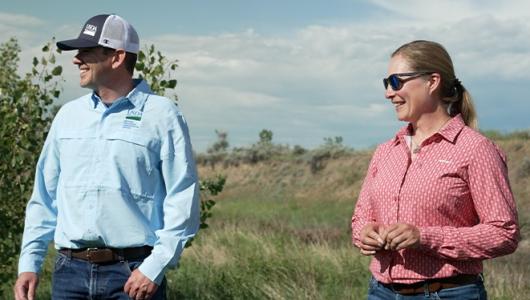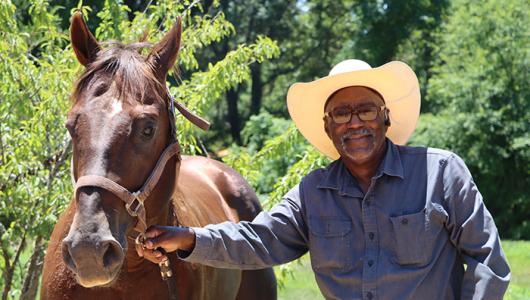This Friday meet Paige and George Nester of Creek House Honey Farm in Canyon, Texas, located outside of Amarillo. To many, the presence of alfalfa, clover, and thistle weed are an unwelcome site. But when you’re in the “bee business” like Paige and George, these native pollinator plants are pure gold.

The Nesters’ journey took root in 2011, starting out small and learning more as they went. Since then, they have expanded from just two hives to anywhere between 50 to 100 hives, depending on the year as dictated by weather and other environmental conditions.
Now, with the help of their employees, they’ve turned a hobby into a fulltime apiary that sells local, raw honey, and beeswax skincare products. They’ve also opened a winery to sell honey mead and an event center that hosts everything from workshops to weddings.
And they’ve started a restaurant, complete with a spacious patio and venue overlooking their pollinator garden, grassy meadow, and pastureland beyond.

Expanding the Hive
Paige, a former schoolteacher, and George, a former pharmacist, put a lot of time and thought into changing their careers. Paige said it was “a leap of faith” that took them toward becoming fulltime bee operators, but they were still not quite sure how to make it happen.
George’s Aunt Sally did research and discovered that USDA’s Natural Resources Conservation Service (NRCS) could help. After reaching out, NRCS District Conservationist Jeff Lewter met with the couple to figure out how to increase pollinator habitat on their land.

With the Environmental Quality Incentives Program (EQIP), NRCS helped the Nestors plant 40-acres of pollinator species, implement herbaceous weed control using mechanical methods, and provided additional technical advice.
“It’s been neat to watch them start this from scratch and be involved with that right from the get-go,” he said, pointing toward an area that, but for the drought, is typically bursting with pollinators. “For us, it’s been a lot of fun getting to know them and watching them build the Creek House Honey Farm business from basically nothing.”
While the Nesters increased pollinator habitat on their property, they’ve found that moving the bees also helped.
“If all of our hives were on the property all-year round, that’s a lot of traffic on our porches, especially if it’s a dearth like this, they’ll find nectar on our porches instead of the pastures,” said George.

For nearly 10 years, they’ve reached out to farmers around the Wellington area to bring their bees to their crops, where there is more nectar during certain parts of the year. While this helps the Nesters, it’s also helping the farmers increase their crop yields.
“We communicate often on spraying and timelines with both the farmer’s needs and bee health in mind,” Paige said. “It’s been a very good relationship for both of us.”
The Sky is the Limit
Paige and George are focused on quality and their ability to provide products that provide natural healing to their community.
“I don’t want to commercialize and get that big, but I would like to continue to be innovative as far as producing products from the bees in our community and to keep those folks coming back through the doors,” said George.

He said they’ve learned a lot since they started and urges others to step out of their comfort zone like his family did and have some fun and learn something new, while getting in touch with nature.
The Nesters are making strides educating their community about bees, starting a bee club for beekeepers, and hosting local schools for educational field trips.
“We started a bee club a couple years ago in the hopes to train other beekeepers.” Paige said, explaining that it’s difficult to keep bees in the Texas Panhandle. “We teach how to appropriately keep a hive alive. We train other beekeepers and then those beekeepers go out and educate. It’s a great feeling.”
More Information
Visit local farms, ranches, forests, and resource areas through our Fridays on the Farm stories. Meet farmers, producers, and landowners who are working to improve their operations with USDA programs.
USDA offers a variety of risk management, disaster assistance, loan, and conservation programs to help producers weather ups and downs in the market and recover from natural disasters as well as invest in improvements to their operations. Learn about additional programs.
For more information about USDA programs and services, contact your local USDA service center.
For more information about this story, contact Rebecca Gresham, public affairs specialist with NRCS in Texas.


